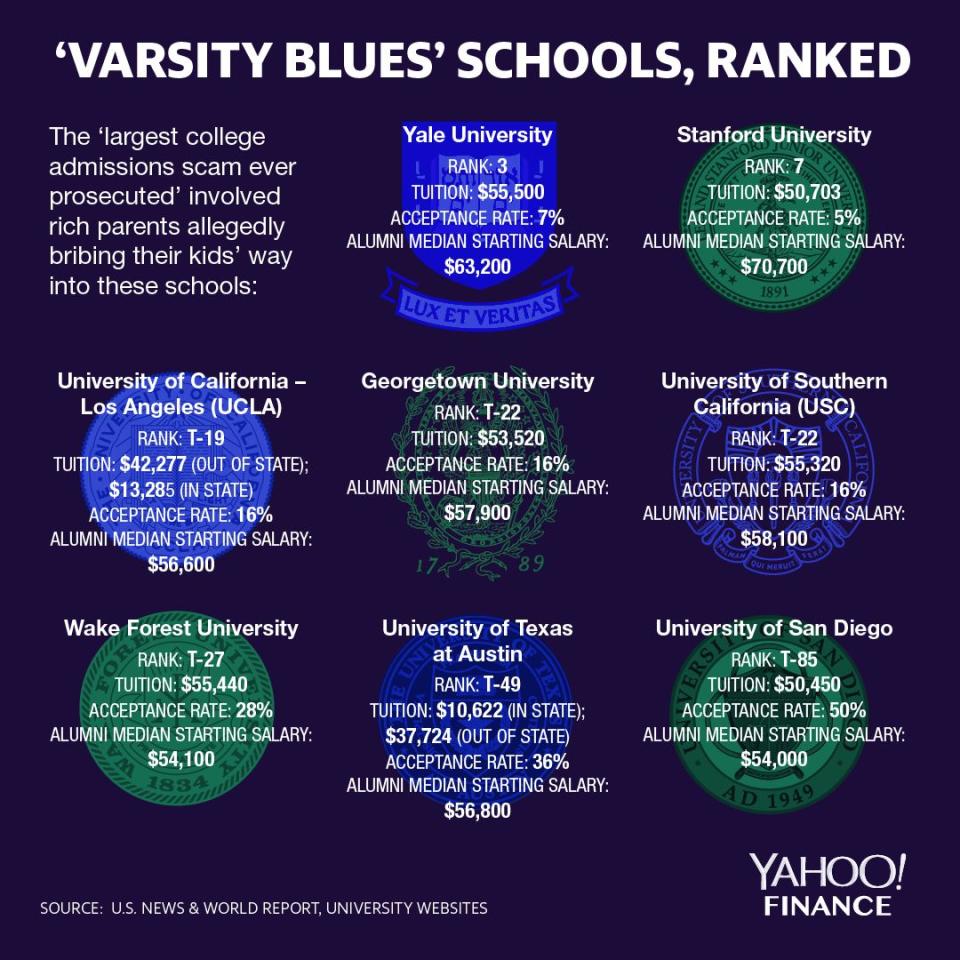No justice for students rejected from universities during alleged admissions scam
College applicants who were rejected from top universities while students with false records gained access may never get the justice they deserve.
In a stunning criminal indictment unsealed Tuesday, federal prosecutors in Massachusetts laid out their case against wealthy parents, college athletic and administrative officials, and purported college prep professionals who allegedly conspired to ensure spots for privileged students at top-ranked universities.
In a 204-page affidavit, a special agent for the FBI claims that millions of dollars flowed from wealthy parents — often through a fraudulent nonprofit organization supposedly created to assist underprivileged youth — directly into the hands of William Rick Singer, the organization's founder, who used the funds to bribe athletic department coaches, universities, a college administrator, standardized test administrators, and imposter test takers.
Possible class actions from rejected students
While the criminal action charges more than 50 defendants with crimes ranging from conspiracy to defraud the U.S., to conspiracy to commit money laundering, wire fraud, racketeering, and obstruction of justice, and with potential punishment ranging from hundreds of thousands of dollars in fines to 20 years in prison, it does nothing to compensate students whose applications were turned down to make room for others who were fraudulently admitted.

However, the universities may face civil suits from rejected students.
“The most likely civil causes of action I could think of would be something in the area of consumer fraud type action,” Adam Mortara, a lawyer who sued Harvard on behalf of plaintiffs who argued that the school’s admission process wrongfully discriminated against Asians, said. “These universities all publicize on their website descriptions of their application processes, and in many cases, make statements about their application process that are inconsistent with some of the things we're seeing in the affidavit and the complaint, in particular with regard to how athletes are admitted.”
It’s foreseeable that students who applied to certain schools named the complaint could seek to recover their application fees, possibly in a class action, Mortara said, because they unknowingly participated in an application process that potentially was mischaracterized. The indictment claims that Singer exploited a practice that certain universities named in the complaint use to reserve spots for athletic recruits who fail to qualify for admission based on the school’s general criteria.
“When you're talking about class relief, if somebody were to get a class certified here, that could be significant money,” Mortara said.
An alleged $25 million conspiracy
According to the government’s indictment, Singer’s scheme began in 2011, and continued up until the action was filed.

According to the affidavit, parents who participated in the conspiracy paid Singer $25 million, which he used, at least in part, to bribe coaches and university administrators.
Singer agreed to facilitate admission of an applicant to Yale in exchange for $1.2 million, directed $350,000 to a private soccer club controlled by University of Southern California coaches, and multiple payments of $50,000 to $100,000 to a USC university account controlled by a senior athletic department official, according to prosecutors.
Singer allegedly directed $20,000 per month based on a sham consulting agreement with a USC administrator, paid a Georgetown University tennis coach bribes of more than $2.7 million, and directed $100,000 to accounts controlled by the women's volleyball coach at Wake Forest University. He also directed a payment of $110,000 to the Stanford University sailing program in exchange for the sailing coach's agreement to designate an applicant as a sailing recruit, and accepted payments to secure spots at University of California Los Angeles, University of San Diego and University of Texas, prosecutors said.
In addition, the affidavit alleges that parents generally paid Singer purported donations between $15,000 and $75,000 for each standardized SAT or ACT test that Singer fraudulently arranged to obtain. In all, Singer is alleged to have provided what he termed “side door” admission services for 761 clients. Imposter test takers were paid $10,000 per test, and test administrators were paid $5,000 to $10,000, per test, the indictment states.
In Stanford’s case, one year’s worth of applications currently generates more than $3 million. In 2017, the University accepted 5% of a record 38,828 students who applied. From the 36,887 students rejected that year, the school would have brought in a combined $3,319,830 if each paid its $90 application fee. If colleges named in the complaint are proven to have evaluated applicants using discriminatory criteria, the schools could face tens of millions of dollars in fee-based lawsuits.
Other types of civil claims could be too difficult to prove, because every plaintiff would have to be able to prove they would have been admitted, but for the unlawful bribery scheme, Mortara said.
As for the criminal case, jail time, in addition to fines, could be a possibility for the defendants.
“It's very tough to crystal ball it...but I do think jail time is always on the table with an enterprise corruption indictment,” criminal defense attorney, Elena Fast, said.
“I do think the person that organizes the scheme is really in the worst position out of out of everyone,” Fast said. “I get it from the parent’s perspective...from a coach's perspective, I don't know what you say about the motive except for monetary greed.”
Alexis Keenan is a New York-based reporter for Yahoo Finance. She previously produced live news for CNN and is a former litigation attorney. Follow her on Twitter at @alexiskweed
More from Alexis:
Boeing could face ‘absolutely devastating’ economic impact after crash
Tesla’s move to close stores puts dealer franchise debate in the spotlight
How the legal fight over Trump’s border wall could hurt the economy
Weed consumers no longer ‘stoner that lives in his mom’s basement’: CEO
NYPD: Waze users who post sobriety checkpoints may be committing crimes
How legalized cannabis changed Colorado in the past five years

 Yahoo Finance
Yahoo Finance 